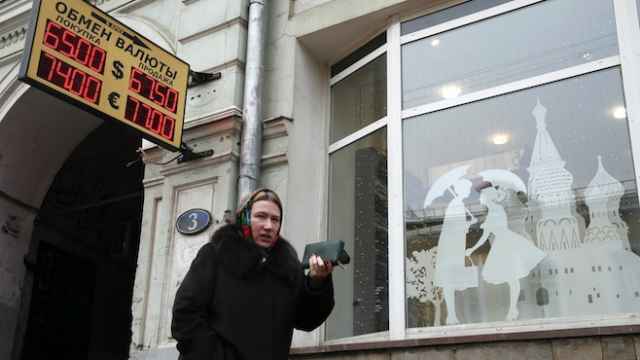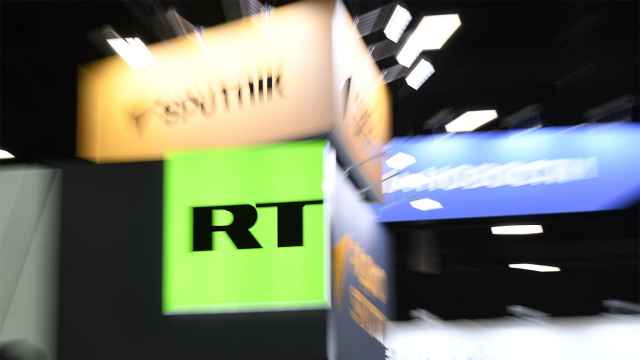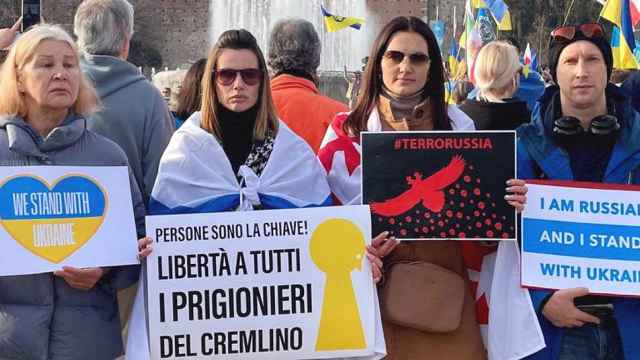The ruble and Russian shares slipped on Tuesday as oil prices went into reverse and fighting intensified in eastern Ukraine, pushing last week's peace deal aimed at ending the 10-month-old war there closer to collapse.
At 7:20 p.m., the ruble was flat against the dollar at 63.19 and down 0.02 percent to 72 versus the euro.
Around 1 p.m. on Monday the Ruble was trading slightly higher against the dollar at 62.3, while trading at 71.1 against the Euro.
Russian stock indexes slipped into the red toward evening, having been buoyed earlier on by the oil price and European markets that shrugged off Monday's failure to reach a deal on Greece's debt problems on Monday.
At 6:50 p.m., the dollar-based RTS index was down 0.3 percent to 894 while the ruble-based MICEX was down 0.38 percent at 1,793.
International oil benchmark Brent continued to rally in the morning but then fell back and was down over 1 percent to $60.6 by evening.
"We suspect [the ruble] is now in for a tougher period in the near term. USD/RUB has declined to a level that is appropriate given the Ukraine-related risk premium," analysts at Sberbank Investment Research said in a note.
Hopes that last week's peace deal in Minsk would end the war in eastern Ukraine have been all but scuppered, with pro-Russian rebels continuing attacks on the town of Debaltseve, the focus of recent fighting, in defiance of a cease-fire.
"Investors are much more worried about the situation around Debaltseve [than Greece], threatening the fragile truce in the Donbass," VTB24 analyst Oleg Dushin said in a note.
Recalling how events developed after the first version of the 'Minsk peace' [in September], one can with high certainty note that in future things will only get worse," said Andrei Dirgin, head analyst at Alfa-Forex, in a note.
The first Minsk cease-fire was routinely violated by artillery exchanges between both sides, before eventually rising into a territorial push by the separatists into government-held territory.
The progress of peace efforts in Ukraine is a crucial driver for Russia's financial markets because the future of Western sanctions against Russia hinges on these efforts. U.S. and EU sanctions have severally curtailed Russian companies access to foreign financing and limited oil companies access to much-needed Western technology.
On Monday, the European Union kept the pressure up on Russia and the rebels allegedly receiving Russian support by announcing a new list of separatists and Russians targeted with sanctions. Moscow promised an "adequate" response.
A Message from The Moscow Times:
Dear readers,
We are facing unprecedented challenges. Russia's Prosecutor General's Office has designated The Moscow Times as an "undesirable" organization, criminalizing our work and putting our staff at risk of prosecution. This follows our earlier unjust labeling as a "foreign agent."
These actions are direct attempts to silence independent journalism in Russia. The authorities claim our work "discredits the decisions of the Russian leadership." We see things differently: we strive to provide accurate, unbiased reporting on Russia.
We, the journalists of The Moscow Times, refuse to be silenced. But to continue our work, we need your help.
Your support, no matter how small, makes a world of difference. If you can, please support us monthly starting from just $2. It's quick to set up, and every contribution makes a significant impact.
By supporting The Moscow Times, you're defending open, independent journalism in the face of repression. Thank you for standing with us.
Remind me later.





